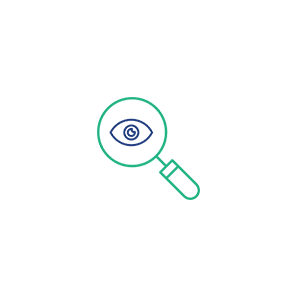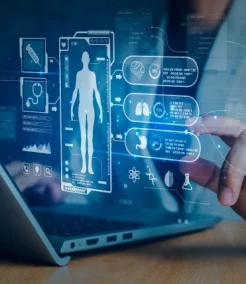Transform Healthcare with
AI-assisted Computer Medical Imaging

Overview
Power medical imaging with AI to improve assistive diagnostics and public health worldwide. AI's impact on diagnostic medical imaging has the potential to be massive around the globe. It allows for impressive accuracy and sensitivity when it comes to identifying abnormalities, which can further enhance detection and characterization to promote greater care.

Solution
AI is increasingly encouraging medical experts to uncover hidden insights, enable clinical decision-making, connect patients with resources for self-management, and extract meaning from previously inaccessible, unstructured data assets. Begin the AI-assisted diagnostic imaging revolution and expedite the process of detection and quantification of clinical and medical conditions with our AI in medical imaging applications. Leverage the power of AI and computer-aided diagnostics to achieve excellent accuracy and sensitivity in the detection of medical abnormalities that help assist doctors and medical experts to assess, and diagnose patients at a faster rate.

Capabilities
Identifying Pulmonary Abnormalities
Fracture Detection
Flagging Thoracic Complications
Diagnosis of Neurological Conditions
Cancer Detection and Prediction

Complex and multidimensional patterns of pulmonary function tests help in identifying disease subtypes and speeding up the treatment process. AI in bronchology facilitates cancer detection and identification.

X-ray imaging is a primary tool used for the detection of fractures in patients. Using AI for the detection of fractures can overcome the most common diagnostic error of missed fractures. Implementation of AI algorithms to identify fractures from X-rays and CT scans shows five times the number than a medical expert.

Conditions such as Pneumonia, Pneumothorax, Tuberculosis, can be overlooked by the doctors if the patient suffers from any pre-existing lung conditions. In such cases, AI appropriately identifies high -risk patients.

AI in Neurology can be used to assist doctors and experts in neuro-oncology, glioma survival rates, neurodegeneration which includes Parkinson’s, Alzheimer’s, and Amyotrophic Lateral Sclerosis (ALS) using physiological images and signals.

Tumour detection is prone to misdiagnosis. Identifying tumors and suggesting appropriate medication can often be tricky. Using deep learning algorithms, tumors can be identified well before they become aggressive.
Business Impact

Reduction in time to operate

Reduction in time to diagnose

Improved Accuracy
Resources
Case Studies

Improving Healthcare Quality and Cost Transparency for Em...

Enhancing Cloud Security & Infrastructure Automation ...

Empowering Crowd Management with Comprehensive Historical...

Thank you for reaching out to us!
Our experts will be in touch with you shortly.
In the meantime, explore our insightful blogs and case studies.
Something went wrong!
Please try it again.